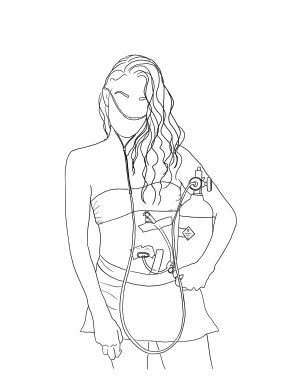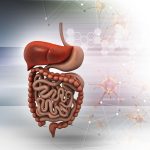How My Pain Could Make You a Better Person
Written by |
I’m starting to doubt the reasons why I doubt myself.
Let’s start this column in a weird place: constipation. If one of my best friends is constipated (I bet you didn’t think we’d drop BMs into your DMs that fast, did ya?), she might complain a little to me, lament the fact that she doesn’t drink enough water when she travels, and in a few days, it resolves.
On the flip side, if I am blocked up in any particular way (despite being on every medication for it, to which my innards no longer respond), I might complain, lament, and move on. But then my colon prolapses. Or has to be removed. Or I tear pieces inside and out just by straining or coughing or eating. You get the picture. (But don’t actually picture it, because that’s gross.)
The list of examples goes on and on, but the fact of the matter is: My pains often become permanent problems, and yet I so rarely treat them that way.
“We might need to pull over so I can use the restroom,” I say to my husband on our long attempt at a road trip. “I’m so sorry. Something feels off.” And I apologize, and apologize, and apologize, like that’s a symptom in and of itself.
The other day, when “re-pologizing” for the millionth time, I realized, “Why am I saying I’m sorry through the Healthy Lens, and never through my own?”

Art by Bonnie Ong. (Courtesy of Bailey Anne Vincent and Bonnie Ong)
Sure, constipation may be simple for my friend, partner, or kids. But for me, it can be disastrous.
Sure, low-grade back pain is normal for a fellow dancer. For me, it might mean replacing a whole disk.
Sure, a common cold may simply involve DayQuil and bingeing Season 2 of “See” for most (you need to see “See”), but it’s a CF downslide on this side.
Nearly every time I say something is wrong, it ends up being wrong. So who the hell am I apologizing to all the time?
One of my digital friends and fellow ComeBacks dancers, Erika, once joked that healthy peers and colleagues might understand our weird and rare pains better if we compared them to common ills and ails.
“I hurt so bad all week,” I told her when she asked how dance was going. “I’m worried it showed all over my face, and now my boss will think I’m a B.” It’s hard for someone to know pancreatic-liver pain if they haven’t experienced it. Or “the disk in my neck is screwed, yet I’m still driving this car and turning my head to read your lips” pain. And on and on.
And she’s right. Maybe if we compare it to something most of us know, then we’d all know a little bit more about each other. For example, “This lung infection pain is like four common colds plus a night in a smoky bar.” Or, “This exacerbation is like a month-long flu, mixed with a hangover, mixed with too much Taco Bell.”
One of my favorite ICU nurses (OK, she’s the favorite) messaged me recently to say she understood what we patients go through more profoundly, in the chronic sense, because she’s been dealing with her own herniated spine nightmare and the resulting damaged nerve delineations.
I was blown away by this gesture. When someone who already exists in proximity to the weird, pain-ranking roller coaster of long-term illness can still find a way to delve deeper and feel more for someone else, it’s powerful.

“Throwbacks to throwbacks.” Bailey in 2015. (Photo by Ian Pettigrew)
Empathy would heal the world if we weren’t too pained to pay attention. Pain is the greatest equalizer. Something happens to us humans when we’re knocked down and must ask for help. When faced with the type of sickness that requires assistance — someone to bring you soup, lift your suitcase, or drive your car — it hits us like a ton of bricks that nothing is guaranteed. You’d think we’d all know this now more than ever, after more than a year of “sitting out” and forced time off due to the pandemic, but the minute that task demand ticks off again, we forget those stuck in transit.
If we all viewed our worst day as a means to become better at relating, to use empathy and Other Shoe Syndrome to reflect on what we don’t always recognize in others, how much better would the world be? How many fewer “It’s too much work” responses would we get when asking for adaptations? How many more addendums and accommodations, plus kindness in kind?
Want to make the world a better place? Here’s what you do: Take a moment right now to message a friend who’s been struggling with their body or mind and say, “I don’t know how you do it.”
That’s it. That’s the first place to start.
Sometimes recognizing how hard it is for someone else is the easiest way to make everything just a little bit better.
***
Note: Cystic Fibrosis News Today is strictly a news and information website about the disease. It does not provide medical advice, diagnosis, or treatment. This content is not intended to be a substitute for professional medical advice, diagnosis, or treatment. Always seek the advice of your physician or other qualified health provider with any questions you may have regarding a medical condition. Never disregard professional medical advice or delay in seeking it because of something you have read on this website. The opinions expressed in this column are not those of Cystic Fibrosis News Today, or its parent company, Bionews, and are intended to spark discussion about issues pertaining to cystic fibrosis.








Leave a comment
Fill in the required fields to post. Your email address will not be published.